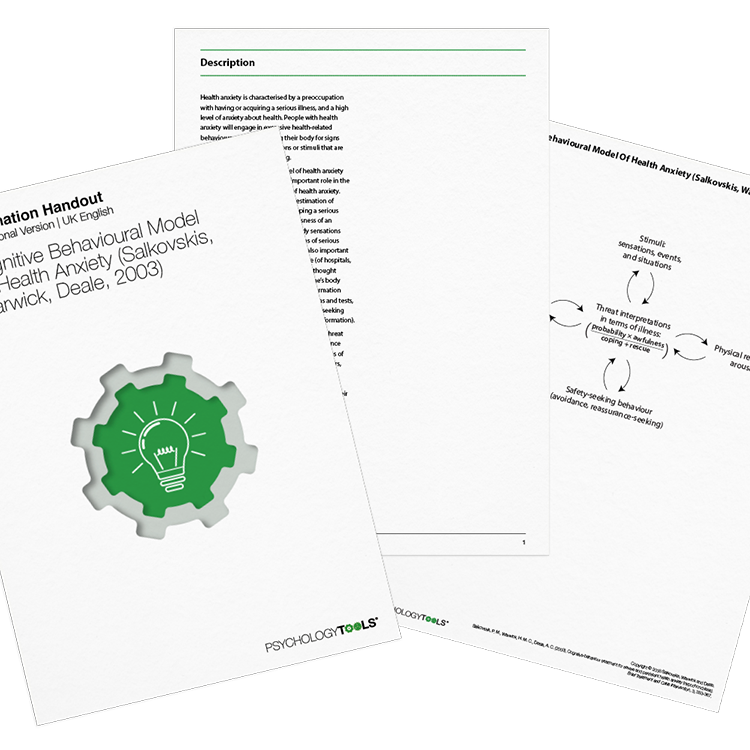Professional version
Offers theory, guidance, and prompts for mental health professionals. Downloads are in Fillable PDF format where appropriate.
A licensed copy of Salkovskis and colleagues (2003) cognitive behavioral model of health anxiety, which describes a framework to address key components of this disorder.

Offers theory, guidance, and prompts for mental health professionals. Downloads are in Fillable PDF format where appropriate.

Health anxiety is characterized by a preoccupation with having or acquiring a serious illness, and a high level of anxiety about health. People with health anxiety will engage in excessive health-related behaviors, such as checking their body for signs of illness, or will avoid situations or stimuli that are perceived as anxiety-provoking. The Cognitive Behavioral Model Of Health Anxiety illustrates how mis-appraisal of body symptoms as threatening results in emotional and physiological feelings of anxiety, safety-seeking behaviours, all of which serve to maintain the threat appraisals.
Understanding the key underpinnings of health anxiety is important for effective intervention.
Designed to help clients affected by health anxiety.
Understand more about the cognitive behavioral model of health anxiety.
Use the model as a template to organize your case formulations.
Use your knowledge of the model to explain maintenance processes to clients.
Engage clients in discussions about their beliefs and behaviors.
Customize interventions based on individual maintenance mechanisms.
Use in supervision to discuss case conceptualizations and treatment plans.
Health anxiety is characterized by a preoccupation with having or acquiring a serious illness, and a high level of anxiety about health. People with health anxiety will engage in excessive health-related behaviors, such as checking their body for signs of illness, or will avoid situations or stimuli that are perceived as anxiety-provoking.
The Cognitive Behavioral Model Of Health Anxiety describes which factors play an important role in the development and maintenence of health anxiety. Cognitive factors include the overestimation of the probability of having or developing a serious illness, overestimation of the seriousness of an illness, and misinterpretations of body sensations / functions / appearance as indications of serious illness. Safety seeking behaviors are also important in health anxiety and include avoidance (of hospitals, sick people, blood, reminders of illness, thought suppression, distraction), checking (of one’s body & bodily functions, of one’s memory), information seeking (via repeated medical consultations and tests, searches for information), and reassurance seeking (from professionals, through searches for information).
This model of health anxiety conceptualizes threat interpretations as being central to the experience of anxiety. These interpreations lead to feelings of anxiety, physical reactions, and safety behaviors, which all act to reinforce the health appraisals. It suggests that targets for treatment include the client’s appraisals (of symptoms, health, illness, their vulnerability and ability to cope), and their coping behaviors.

Just enter your name and email address, and we'll send you Cognitive Behavioral Model Of Health Anxiety (Salkovskis, Warwick, Deale, 2003) (English US) straight to your inbox. You'll also receive occasional product update emails wth evidence-based tools, clinical resources, and the latest psychological research.
This site uses strictly necessary cookies to function. We do not use cookies for analytics, marketing, or tracking purposes. By clicking “OK”, you agree to the use of these essential cookies. Read our Cookie Policy